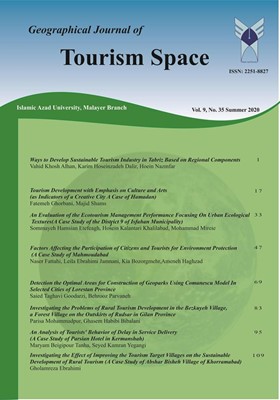An Evaluation of the Ecotourism Management Performance Focusing On Urban Ecological Textures ( A Case Study of the District 9 of Isfahan Municipality)
Subject Areas :
Somayeh Hamsian Etefeagh
1
,
Hosein Kalantari khalil abad
2
*
,
Mohammad Mireii
3
1 - Urbanization Dpt., central Tehran branch, Islamic Azad University, Tehran, Iran
2 - Urbanization Dpt., central Tehran branch, Islamic Azad University, Tehran, Iran & Architecture Dpt., Jihad Daneshgahi, Tehran, Iran
3 - Department of Urban Planning, Central Azad University of Tehran, Tehran, Iran, Guest, Department of Geography, Farabi Campus, Tehran, Iran
Received: 2020-08-03
Accepted : 2020-08-11
Published : 2020-08-22
Keywords:
Management,
Ecotourism,
ecological textures,
Abstract :
The purpose of this article is to provide a model for evaluating the performance of ecotourism management with emphasis on the management of the ecological context of the city in District 9 of Isfahan Municipality. For this purpose, the grand theory method has been used. Using library and field studies and implementation of the grand theoretical method, 3 dimensions, 10 criteria and 35 sub-criteria have been extracted. The main dimensions include urban context management with categories, legislation, planning, resource management and control and supervision; the context of ecology included categories with protection, development and improvement, and also the ecotourism included categories such as economic, social, environmental and cultural ones. The results of this study indicate that the current situation of ecological tissue management in District 9 of Isfahan Municipality is not favorable, but the situation can be improved. Based on the results of this study, it can be said that the weaknesses in laws, lack of proper planning and lack of attention to the basic uses, have all caused the ecological situation of the region no to be in a good condition presently.
References:
بزمآرا بلشتی، مژگان، توکلی، مرتضی و جعفرزاده، کاوه، 1396، ارزیابی پهنههای مناسب توسعه اکوتوریسم در مناطق حفاظت شده مطالعه موردی: منطقه حفاظتشده خاییز، برنامهریزی و آمایش فضا، دوره 21، شماره 3.
توکلینیا، جمیله، متوکلان، علی، صرافی، مظفر و بوربوری، فائزه، 1397، ارزیابی تناسب مکانی برای توسعه اکوتوریسم در منطقه رود بار و قصران و لواسانات با استفاده از روش OWA با کمیت سنجهای فازی، مجلهی برنامهریزی و توسعه گردشگری سال هفتم، شماره ی 26، 95-68.
حسنقلیپور، حکیمه، قلی پور، آرین، محمدی قاضی محله ، مهدی و روشندل اربطانی، طاهر ، 1389، الزامات، ضرورتها و مکانیزمهای تجاری سازی دانش در دانشکدههای مدیریت، مدیریت بازرگانی، دوره 2، شماره 6، 60-41.
عرباسدی، حسین و رستمی، معصومه، 1395، ارزیابی توان اکولوژیک شهر میامی به منظور توسعه پایدار شهری با استفاده از روشAHP، فصلنامه انسان و محیط زیست، شماره 37.
محمودزاده، ابراهیم، رحمتی، نفیسه و رفیعیانراد، سیدمرتضی، 1391، مدلی برای تصمیمگیری خرید مشتریان محصولات فناورى برتر پژوهشی در نمایشگر قلب شرکت صاایران، نشریه علمى – پژوهشى مدیریت نوآورى، سال اول، شماره 1، 75-61.
نصرآزادانی، فاطمه، 1393، بازطراحی و ارتقای کیفیت محیطی محلات شهری با رویکرد محله سبز (نمونه موردی: محله کارلادان اصفهان)، پایاننامه کارشناسی ارشد، دانشگاه شیراز، رشته طراحی شهری.
Brandt, J.S.Buckley, R.C. 2018, A global systematic review of empirical evidence .of ecotourism impacts on forests in biodiversity hotspots, Current Opinion in Environmental Sustainability, Volume 32, Pp.112-118.
Gigović, L., Pamučar, D., Lukić, D., & Marković, S., 2016, GIS-Fuzzy DEMATEL MCDA model for the evaluation of the sites for ecotourism development: A case study of “Dunavski ključ” region, Serbia, Land Use Policy, 58, 348-365 .
Hussin, R., Cooke, F. M., Kunjuraman, V., Mahdzar, M., Ling, S. M., Nair, M. B., & Shuib, A ., 2015, Community-based ecotourism (CBET) activities in Abai Village, Lower Kinabatangan area of Sabah, east Malaysia. InProceedings of the International Conference on Natural Resources, Tourism and Services Management, Sabah, Malaysia, University Putra Malaysia, 169-175.
Janusz, G. K. & Bajdor, P., 2013, Towards to Sustainable Tourism Framework, Activities and Dimensions. Procedia Economics and Finance, 6, 523- 529.
Osmana, T., Shawb, D., Kenawya, E., 2018, Examining the extent to which stakeholder collaboration during ecotourism planning processes could be applied within an Egyptian context,Land Use Policy, 78, Pp. 126–137.
Walden-Schreiner,C., FaiLeung, Y., and Tateosian,L., 2018, Digital footprints; incorporating crowd sourced geographic information for protected area management" .Applied Geography, Volume 90, Pp. 44-54.
_||_

